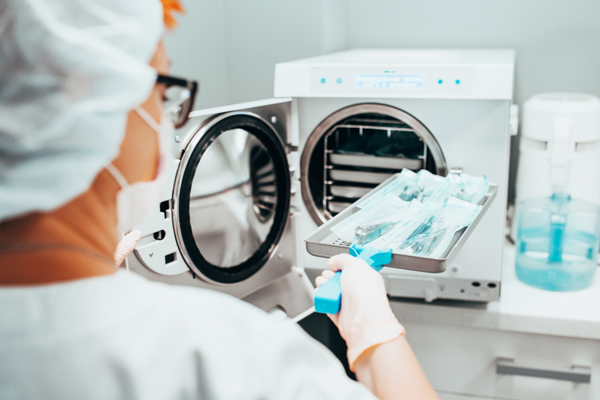Why Sterile Services Techs are the Real Unsung Heroes When Beating the Backlog

Sterile services technicians are an integral part of healthcare strategies across the globe, ensuring high levels of care and even helping organisations to tackle their staff backlog. Some might see this as an underappreciated role, even though they effectively make sure that hospitals and other facilities follow certain standards. Organisations sometimes struggle to fill this position – which has a strong impact on their ability to deliver quality care. In this article, we look at the importance of sterile services technicians and how they can help reduce current medical staffing backlogs.
What are Sterile Services Technicians?
Sterile Services Technicians are responsible for decontaminating equipment after use; this prevents potentially lethal infections from developing. The technicians typically work in hospital operating theatres as well as clinics and wards, collecting reusable instruments after surgeries and examinations. They disassemble this equipment if necessary to ensure a thorough clean – sterilising as appropriate to guarantee everything works properly and is ready for the next patient. Without dedicated staff to help with this, other team members may need to tackle this duty, which can significantly increase the time between each procedure.
Certain items such as dressings and needles need restocking after use and cannot be cleaned or sterilised – the sterile services technicians make sure that these resources are easily available. In this case, it’s the technician’s job to collect new supplies from the premises and deliver them to the theatre or ward. These technicians must maintain a strong commitment to hygiene so they don’t contaminate the supplies or equipment themselves by handling them without gloves. On top of this, they must safely discard tools or items they cannot sterilise.
As part of their sterilising duties, they may operate a steam sterilising machine – which uses intense heat to kill contaminants such as bacteria. The time it takes for each item depends on several factors, including its size and current condition, though it’s vital that technicians never assume something is sterile based entirely on a visual inspection. This role has few formal requirements, but employers usually ask for good literacy and numeracy in the form of GCSEs or equivalent qualifications; science-based college qualifications could also help with this.
The Importance of Sterile Services Technicians
This role is important because these technicians are proficient in sterilising techniques and can guarantee that other medical professionals in the organisation only use clean equipment. With time and experience, they can even make procedures more efficient by ensuring everyone has the tools or items they need exactly when the next patient is ready. If the team has no dedicated sterilisation experts, someone else on the team might need to take over this responsibility; if they make a mistake, they could expose patients to an infection risk.
On top of this possibility, a dedicated technician helps the team save time and begin the next procedure much faster. Surgeons can only see so many patients each day – every minute counts in making sure everybody gets the care they require. Sterilisation could be necessary at virtually any time in a hospital setting; this means these technicians can work tirelessly, and often at night. This helps ensure the safety of emergency or nighttime services and allows for an earlier start time the next day, maintaining the facility’s commitment to health.
Without adequate decontamination procedures, surgeons might be using scalpels that contain bacteria from a previous patient. Alternatively, nurses without access to new gloves could reuse their current pair and possibly spread an infection in the process without realising it. A comprehensive sterilisation strategy is the only way that healthcare organisations can reliably decontaminate their tools. For this reason, sterile services technicians are a critical part of any facility’s health and safety strategy – their presence has a provable, positive effect on both short-term and long-term patient outcomes in clinical settings.
Sterile Services Technicians and the Staffing Backlog
The operational efficiency of major healthcare organisations worldwide typically comes down to the combined actions of all staff members. Without an adequate number of recruits or experienced professionals, the quality of care can suffer and the usual processes may slow down significantly. This is especially prominent in the UK – where the NHS is facing a major staff crisis and some services are struggling to compensate. As a result of this, sterile service technicians are often in high demand, due to their ability to make sure that each procedure is safe.
As healthcare vacancies continue to grow across different departments, facilities may find it difficult to address all the issues that naturally emerge. This has a clear effect on patients who may have to contend with delays or even cancellations to their appointments. The COVID-19 pandemic (and its long-term impact) is also a major factor, with health organisations still recovering from the immense strain on their services. Some countries are still facing this strain on a daily basis – and thus might rely on experienced decontamination professionals even more.
By making sure they have enough people to fill every position, healthcare facilities can deliver even better care to patients and guarantee their time staying in hospital – or undergoing surgery – is as safe as possible. Current patient and staff backlogs will take some time to clear but even small operational changes such as hiring sterile services technicians can make a big difference. Hospitals need an ample supply of qualified candidates in order to tackle the healthcare staffing backlog; a recruitment agency can help connect these technicians with nearby facilities.
Conclusion
Sterile services technicians form a small but pivotal part of the healthcare industry – their skills and experience are instrumental for infection prevention and control during medical procedures. At Globe Locums, we work to ensure that healthcare professionals of every skill level can find a local organisation and facility in need of their abilities. With accomplished sterilisation technicians at their disposal, hospitals, clinics, and wards can optimise their strategy, and continue working with renewed peace of mind. For more on our services or to add yourself to our ever-growing list of qualified healthcare staff, sign up with Globe today.

Candidate Registration
Registering with Globe couldn't be easier. Simply fill in the form below and one of our experienced recruitment professionals will contact you within 24 hours

